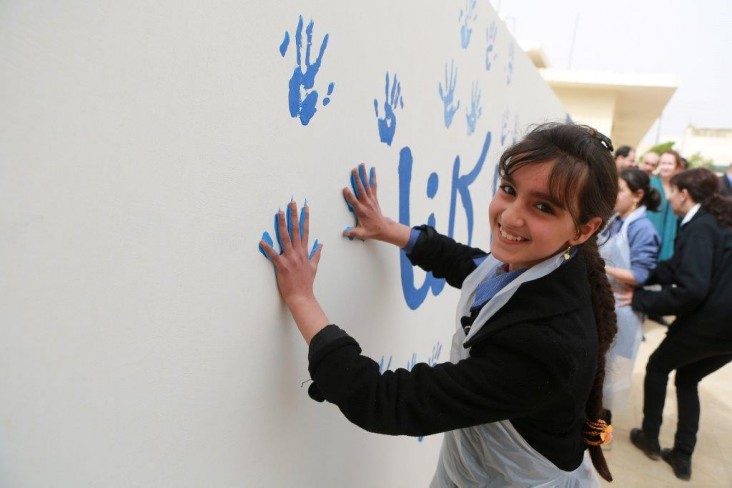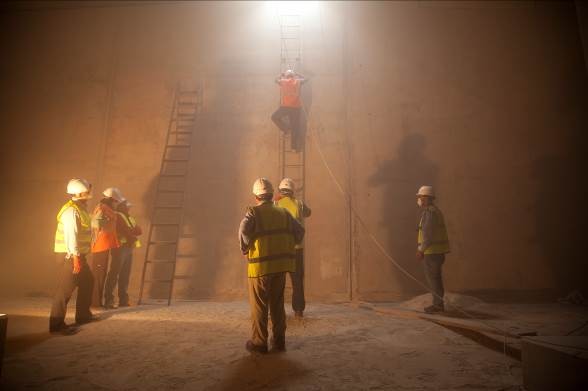Speeches Shim
Background

Domestic water use in Jordan is among the lowest in the world, barely meeting basic household needs for sanitation, cooking, and cleaning. Annual water consumption still exceeds renewable supply, and groundwater aquifers are being depleted at an alarming rate.
From 2006-2013, Community-Based Initiatives for Water Demand Management (CBIWDM) managed to enable more than 135 communities in Jordan to finance water saving technologies at the household, small farm and community levels. This was accomplished by building the capacity of community-based organizations (CBOs) to raise awareness of water efficiency/water-saving technologies and operate revolving loans to finance water-saving projects.
Project overview
In response to the influx of Syrian refugees, USAID and Mercy Corps partnered once again to build on the project’s previous success through a complex crisis fund-supported cost extension from May 2013 to October 2015. To this effect, CBIWDM II came to life to reduce the social and economic impact of water limitations in host communities. This has been achieved by reducing water losses, improving efficiency, addressing the immediate impact of the Syrian crisis on water resources, and increasing community involvement in managing demand.
The project continues to promote citizen participation to improve efficiency in rural communities, in addition to providing support to northern communities to ease external stressors facing the region. USAID and its partners work with community-based organizations (CBOs) in all 12 governorates – with a particular focus on northern Jordan – to dramatically increase the amount of loan capital provided to CBOs and support communal water catchment projects. Ten percent of all loans specifically target families that are socially/economically vulnerable, while 25 percent target women. CBIWDM is also helping five pilot communities implement integrated water and resource management programs, and conducts leak detection and repairs for municipal water systems in northern Jordan to increase water delivery/availability.
Activities
- Enabling 175 Community Based Organizations to implement lending programs and community mobilization programs that improve water demand management.
- Utilizing outreach, supporting integrated water and resource management programs, and providing revolving loans for water-saving technologies to help communities manage water resources.

- Improving water supply in northern Jordan by upgrading water network infrastructure and by improving the Yarmouk Water Company’s customer relations and ability to respond to emergencies.
- Working with 6 Jordanian host communities and the Syrian refugee population to manage water-related tensions through conflict mitigation projects.
Impact
- Considered proposals from over 500 CBOs in all 12 governorates for water saving/efficiency projects.
- Awarded grants to 177 CBOs from around Jordan averaging $20,000 each to establish revolving loan funds for local communities.
- Dispersed 10,239 loans to rural residents to implement household water-saving projects, indirectly benefiting more than 55,290 individuals. 2,305 of these loans (23 percent of the total number) were for women, and the overall loan repayment rate is over 93 percent.
- Offered training in loan and business management and organizational development to nearly 1,700 individuals from more than 150 CBOs. Around 30 percent of trainees were female.
- Harvested more than 796,000 m3 of rainwater in households and small farms.
- Dispersed 91 grants averaging $20,000 each to 48 CBOs in the northern governorates for implementing 91 communal projects in public facilities, reaching a larger number of beneficiaries.
- Constructed 209 rainwater harvesting cisterns/reservoirs in public facilities (187 schools, 12 health centers, and 10 mosques).
- Supported more than 170 CBO leaders conduct peer-to-peer visits to two CBOs in other governorates.
- Rehabilitated the Zabdah Reservoir, which was losing 9 percent of its water due to wear-and-tear. The reservoir supplies water to Irbid, Ramtha and Jerash.
- Reconstructed the Tabaqet Fahel Well, equipping it to be connected to the water supply network. The well currently provides for 63,000 residents in northern Jordan.
- Rehabilitated the supply water network in Mughayir As Sarhan, Sama Sarhan, in the Mafraq governorate.
- Delivered spare parts to the Yarmouk Water Company to reduce response time for repairs and increase its ability to respond to emergencies.

Comment
Make a general inquiry or suggest an improvement.